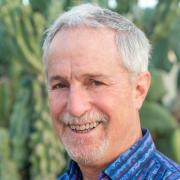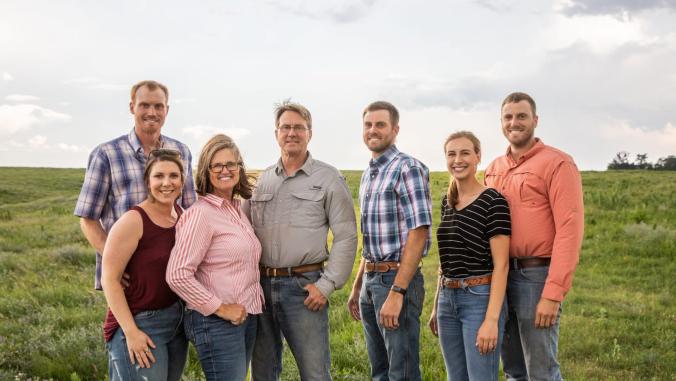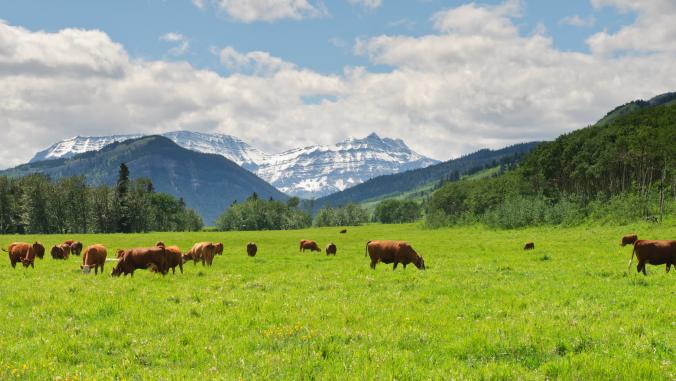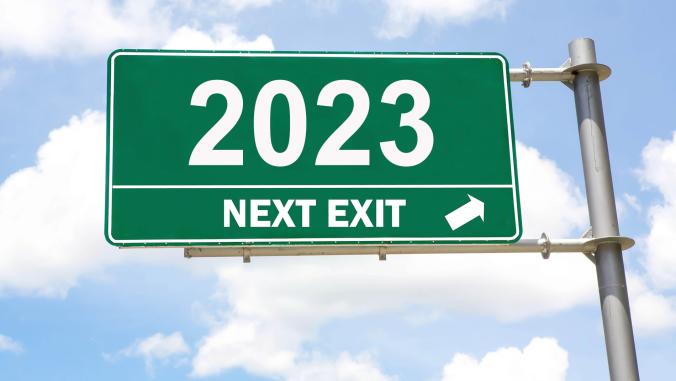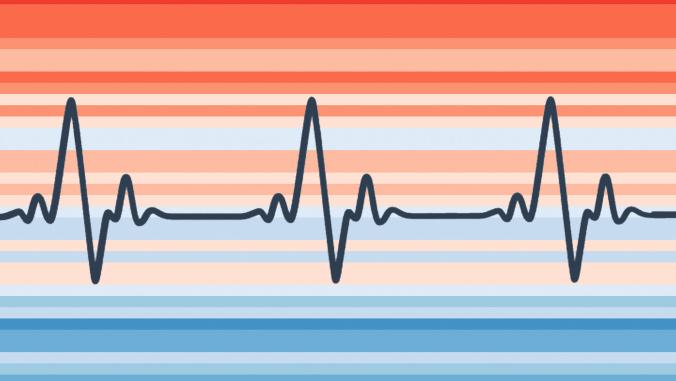The Presidio and the Evolution of the Green MBA
<p>(Episode 101): Since its founding six years ago, the Presidio Graduate School has been at the forefront of sustainability business education, and Seyed Amiry, the head of the school, talks about the future of green business education, especially in tough economic times.</p>
Since its founding six years ago, the Presidio Graduate School has been at the forefront of sustainability business education. Through its MBA and Executive Education programs, Presidio balances a traditional business school curriculum with an emphasis on sustainable business topics and values. That emphasis has made Presidio the fastest-growing sustainability-focused graduate school, with a 25 percent average annual growth in enrollment. GreenBiz.com Executive Editor Joel Makower recently talked with Seyed Amiry to learn how the school is changing along with the times, including tough economic times.
Joel Makower: Seyed, let's start off by talking about what does it mean to be a business school at the end of the first decade of the 21st century, when we think about all that's going on from a financial, environmental, and social perspective?
Seyed Amiry: I think two words perhaps come to mind. One is, "Oh my God." Well, maybe that's more than one word, but many challenges, unprecedented activities that were really not anticipated by many of the experts. And then I would say the flip side of that theme immediately is an opportunity, and that's essentially what's driving Presidio because we certainly see and recognize the challenges that the business world is now facing and their unprecedented nature. And at the same time, we also recognize that the business world is now looking for solutions, and so that's what we're seeing as one of our primary value propositions, both in terms of the model that we have created in delivering and creating the kind of competencies in our graduates. But also then providing a new perspective and new framework and a new lens with which they will approach the new challenges in the business world.
JM: So how has that changed in the last few years, because Presidio was created to fill a void in business school education, I presume.
SA: Yeah.
JM: And that void was that there was -- people coming out of business schools with MBAs did not have the tools to address the social and environment challenges and, of course, aligned with the financial ones. So how has what's happened in the last year or so changed what you need to be doing?
SA: So, basically what happened was that when the school started six years ago, to a large extent it was still viewed as a, if you will, an idealistic or idea-driven or ideology-driven type of a program and school. Within the higher education arena we heard the terms of being, "Well, it's a fringe school," and so forth, or a niche school.
But what's happened within the last few years, and again the kind of challenges that the business world has faced and continues to face and is becoming more aware of -- the kind of risk factors that are now facing them -- they have in a way recognized that what we were talking about before is not really an ideology but rather a very practical and pragmatic way of doing business. And so to that extent, from an external standpoint, the school and its program is now being viewed much more pragmatically and much more seriously in terms of where the solutions are going to be coming out of. That has certainly impacted the demographics of our students.
Our earlier cohorts, the students who entered the program earlier, were much more focused on, again, the environmental aspects of the challenges that we were facing. The current crop of students who are joining our program, I would say, are more, if you will, business-minded and more traditional in nature in terms of they have their career aspirations within medium to large-size organizations, and they really see themselves not necessarily as activists but as business leaders who are going to be providing these new solutions and frameworks in the 21st century.
And so therefore, our programs have really evolved along with that shift; so there's a much higher focus on application of solutions rather than diagnosing old problems. Although that's still a part of it, but there's a much higher emphasis on systems thinking and business case and creating the kind of solutions that can really be applied immediately in the business world. And so that's how our program has evolved.
JM: Clearly the job market has changed quite a bit in the past couple of years. Although one of the things that we've seen is that this is the first recession perhaps ever, at least in the past 20 years, that the environmental professionals have not been the first ones to be thrown overboard. But yet this is a very challenging job market; so what's happening now with Presidio grads compared to those of a year or two ago? How is -- to the extent there are changes, how is that changing what you're teaching?
SA: So there are obviously -- again, you're absolutely right. I think the current recession has hit every job sector hard, and yes, there are a bandwidth of experts within either the environmental or risk assessment part of sustainability that obviously are in demand. But there's still an element of education that really we are providing or engaged in with the employment market and the companies in general because there's this perceived notion that graduates from a sustainable management program would go into only positions such as directors of CSR or chief sustainability officer or positions that are labeled such as that.
Whereas what we are really talking about and many of our students are now really very much on that track of saying it really is about whatever the profession that one aspires to move into. Whether it's a chief financial officer, controller, director of marketing, IT, operations, HR, and so forth -- that it really is actually you need to have your managers and even the C-level individuals in every office really understand sustainability and be able to integrate that in every aspect of the operations and the strategy of the organization.
And the more that's really becoming learned and understood, that the job marketing is beginning to really understand the difference and therefore the value proposition and preference for those who have had sustainability as a part of their ongoing education rather than the traditional methods. And we're seeing that even among some of the larger recruiters who are now beginning to create categories in the job market search engines that are more descriptive of the background in sustainability. And so these are the kind of changes that we are seeing that's really going to then begin to drive the job market towards our graduates and similar programs.
JM: So what kinds of jobs are Presidio grads getting?
SA: It's really very varied. We have a group of our graduates -- especially in the earlier cohorts but there's still a large section of our students -- who really are very entrepreneurial. They come to Presidio with either a specific idea in mind in terms of wanting to launch either a for-profit business or an NGO or a particular product within a regulatory agency, and they pursue that and their capstone project becomes, in fact, the business plan for whatever it is that they're doing. The venture plans that have gone out of Presidio within the last few years have generated over $10 million in capitalization through VCs and other investment funds.
So there's a large section of our students who are basically starting their own enterprises. And the other group who are more focused on the career track, the kind of jobs that they're getting are either line positions in various functional areas -- again, can be controllers or marketing people and so forth, but more directly related to sustainability. They're mostly in the manager to director levels of sustainability in medium to large-size organizations. Those are the size companies that at this point can afford to create that kind of structure within their own organizations.
In smaller organizations, typically these are individuals who are in actually a fairly senior-level position, and either the entrepreneur or the founder of the smaller businesses believe in sustainability; and therefore, they really prefer to hire someone with that kind of educational background. So it's quite varied. In fact, our website really showcases our graduates and what they're doing, various kind of positions that they're in.
JM: And that, if I recall, is Presidiomba.org?
SA: It's Presidioedu.org.
JM: One of the other things we've seen happen in the past few years is the rise of, what I guess you would see as, competition. Just about every business school is offering some kind of greener CSR or sustainability course, and more than a few of them, in fact quite a few of them, now have some kind of emphasis or specialization in that field. How do you pitch Presidio in a way that differentiates it from everything else that's going on out there?
SA: We really are actually excited to see so many new programs of different varieties and flavors really come up because, as we all know, we just need many more of them, frankly, out there. In terms of how we approach our perspective students is it's really important for us to see what is it that they're looking for initially.
And to the extent that if the students are really looking for a program that gives them the full breadth of competency and being able to have not only the traditional competencies that you would expect from typical MBA or an MPA student, but rather have this other new framework. The ability to understand what it takes to create a more sustainable enterprise not just from accounting standpoint, marketing, human resource management standpoint, and also really understanding the implications that a cross vertical supply chain or going horizontal in various industry levels and so forth.
And not only to be able to do all that, but also be able to communicate it and really be able to sell it in a way that is not viewed as, again, idealistic or that it's very pragmatic, that it's a very compelling business case, and that, in fact, the social value of it comes out as almost a byproduct of it.
And so if this particular student is looking for, if you will, kind of a general knowledge and they're not interested in that kind of full program, there are many other competing type of programs they can choose from. But if they're looking for a program that will really give them not only the -- also the theoretical, but also the hands-on part of it then our program has been designed from ground up around that.
We have had the luxury of not having an existing program that most universities and schools have, and what they'll often do is they would add on a few courses to what they already have. And that will get repackaged as either green or they would add some environmental courses or social responsibility courses. Whereas our program, every course actually has been designed from ground up around sustainability; and therefore -- and it's very fully integrated all the way from beginning to the end.
JM: So this sounds very much like a living, breathing entity in terms of the nature of the curriculum, the nature of the students, the nature of the sales pitch, and of course the nature of the job market. Where do you see things going in the next year or two?
SA: So we are really getting amazing interest. The number of enrollment has been growing very rapidly, and we expect that to continue.
JM: What is your enrollment now and how has it grown over the past few years?
SA: We are now approaching 300-plus. Our MBA program is growing very rapidly and we, in fall, also introduced a new degree program: master in public administration with sustainable management. Again, it's the first in the country that has been designed from ground up around sustainability and policy development, and also we have offered a new executive certificate program, which is a five-month program designed to help senior-level -- mid- to senior-level managers in organizations to be able to essentially understand sustainability and be able to apply it and implement in their own organizations. And so with a combination of all that, our enrollment is now 350 plus, and we expect that to be around 1,000 by 2012.
JM: And so growth is one place where you see this going. I didn't let you finish the answer. Where else will we see changing?
SA: So we also -- our ultimately really objective is to create the kind of impact that we all know we need to create as quickly as possible. So our growth is really not from -- obviously from a business standpoint, it's important for us to generate the resources that we need to deliver the high-quality program that we want to delivery. But really ultimately this is about our mission to have a significant impact very quickly through our graduates and through the work that they're going to be doing.
And so to that end, our plans really include fairly aggressive growth through programmatic innovation and also we are working on a new model, a virtual learning system, Which people talk about an online program, but it really it is different from the traditional online programs in that the way we are designing it is based on the cognitive approach, which is very unique.
Hard to describe, but it's designed to help the learners to learn based on their own style of learning and also detect -- the system will detect the level of competency of the learner so that they don't have to essentially go through more of a linear approach to learning, but rather they can go randomly to the area that they seem to be not understanding.
And so this is a higher interactive system that we have signed a partnership agreement with a company out of Europe to develop and design for us exclusively. And if we are successful, which I am fairly confident that we are, then our plan is then to perhaps franchise that or partner with other institutions who may want to use that platform for offering their programs. And so that's another way of really expanding our reach and the kind of program that we can develop and offer and not be limited to geographic constraints. Obviously from a carbon footprint and so forth, that's also an amazing opportunity to create these social communities around the world.
One of the other aspects of this system is going to be very exciting is to have all of our living cases that our students work on during their work here and anywhere else online so that all of the learners can have access to the most recent projects. As you know, this is a fast-evolving space, and having information about what's really working on the ground now is critical. And therefore, that's -- again, the system is gonna provide that kind of platform for sharing that kind of information and experience.
JM: One of the things I find intriguing about Presidio is the community that you form with your alum, and I know every business school theoretically has an alumni group. Yours seems to be a little more tight-knit and collaborative and engaged, both with each other and with the school. Is that your assessment?
SA: Absolutely. That's really -- I mean the world community is probably the most relevant to describing who we are as an entity. There is really a tight relationship among all the members of the community: faculty, staff, current students, and alumni. And we really leverage that to its fullest. This is a highly engaged group of people who have many areas of collaboration, and many of the projects that alumni work on, they recruit from within. We have an online forum that all of our alumni as well as current students interact with each other regarding the latest topics or whatever the issues or questions may be.
If alumni, for example, is looking for a resource or has a question, all it takes is one question on the forum post and he or she gets literally hundreds of responses and suggestions for resources and so forth. So that's a very robust community and dynamic community.
JM: So given that your mission or your goals are more mission-driven than say quantitative. How do you measure success? How do you know if Presidio is really succeeding in the way that you hope it will?
SA: So I think we certainly want to develop some metrics that -- in addition to obviously certain quantitative metrics that would measure, as you said, the progress in that regard. But in terms of the definition of impact, we really have kind of almost opened that up to question to our own community and saying how do we want to measure the success of our graduates. How do we want to measure the kind of impact that each one of them are having?
For instance, one of our graduates was working on a project when he was going through one of the courses here, and put together with a group of other -- his fellow students put together a proposal for the City of Berkley essentially trying to figure out a new creative way of financing solar installations -- solar panel installations. And so then that pilot became a pilot project in the City of Berkley and then Nils Moe, who's the student, then was actually hired as the assistant to the mayor to actually implement the program for the City of Berkley. Now, how do we measure that kind of success and the impact of that kind of work that has been performed?
We don't necessarily have the answer for that at this point, but what we do know is that we need thousands, if not tens of thousands, of those kind of projects. And I think to a large extent the community will tell us whether they feel that we're being successful and have the kind of impact that we want to have.
JM: Well, I have no doubt that you will -- and the community will figure that out together and will continue to move down the path that you've been on. Thank you so much for your time.
SA: Sure. Absolutely.
